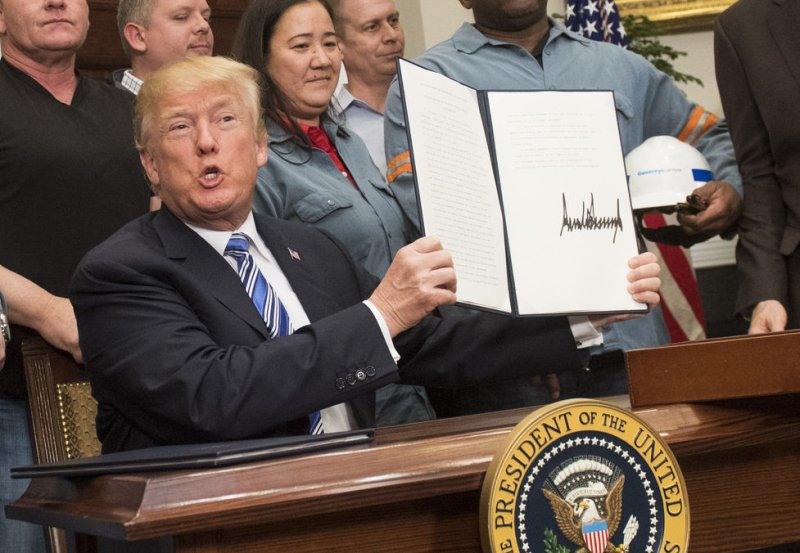President Donald J. Trump holds up a signed proclamation after singing the order applying tariffs to steel and aluminum imports, as he is joined by steel and aluminum makers in the Roosevelt Room at the White House in Washington, D.C. on March 8. The Economic Policy Institute said Tuesday that the tariffs have not had the negative impacts on jobs critics predicted. Photo by Kevin Dietsch/UPI |
License Photo
Dec. 11 (UPI) -- U.S. aluminum tariffs imposed in March have had their intended impact to date of increasing domestic jobs and production, the Economic Policy Institute said Tuesday.
U.S. employment in aluminum industries increased by 300 jobs from the month before the tariffs were imposed to October, the institute's report said.
Meanwhile, U.S. output of both raw alumina and processed aluminum rose rose 9.8 percent, and the output of rolled and extruded aluminum products rose 9.1 percent, during that same time, the Federal Reserve's industrial production physical output data indicate.
More growth is expected, as domestic producers made commitments to create thousands of jobs since 10 percent tariffs were imposed on aluminum on March 8. At the same time, President Donald Trump's administration also announced 25 percent tariffs on steel.
The U.S. aluminum industry has announced that downstream aluminum companies processing aluminum into finished products have grown, generating $3.3 billion in new investments to potentially create 2,000 more jobs.
Congress imposed the tariffs after the publishing of a Department of Commerce report on national security threats based on excessive steel and aluminum imports. The domestic aluminum industry had 18 of 23 domestic smelters shut down between 2010 and 2017 and only one remaining in operation last year with excess capacity and overproduction in China and elsewhere.
Critics including economists from The Trade Partnership firm argued that while the tariffs would save thousands of jobs in primary metal industries, they would have negative effects on thousands of other domestic manufacturing jobs and the beer industry.
However, the EPI study found that the tariffs have not to date had the negative employment effects in other parts of the economy that critics predicted.
The overall manufacturing industry has added more than 200,000 jobs since before the tariffs on aluminum and steel were put in place, according to the Labor Department's November jobs report. Approximately 1.4 million jobs have been created in the rest of the economy during the same period.
But The Trade Partnership Vice President Dan Anthony said the full effect of highest costs and disrupted supply chain are still making their way through the economy.
"It's very easy to say 'Ah, ha, these haven't happened yet,'" Anthony said. "The last thing anyone wants to do is lay off workers."
Tariffs increased by $124 million in October despite a 4 percent decline in imports value, according to data released by Tariffs Hurt the Heartland and compiled by The Trade Partnership.
The U.S. Chamber of Commerce called for steel and aluminum tariffs to be removed while announcing its support for the new trade agreement between the United States, Mexico and Canada, which still needs congressional approval to take effect.
"These tariffs - imposed on our partners as a negotiating tactic - have invited $15 billion in counter-tariffs on U.S. agricultural and manufactured goods," U.S. Chamber President and CEO Thomas Donohue said in a statement. "They must be eliminated without delay."
However, former Sen. Evan Bayh, D-Ind., who is working with the American Primary Aluminum Association, stood by the tariffs remaining in place.
"There are some important national security considerations," Bayh said. "I don't think we ever want to be in a position where we have products that are essential to the United States military that are made from aluminum or steel entirely outsourced through foreign producers, that would put us at their mercy in time of conflict."















